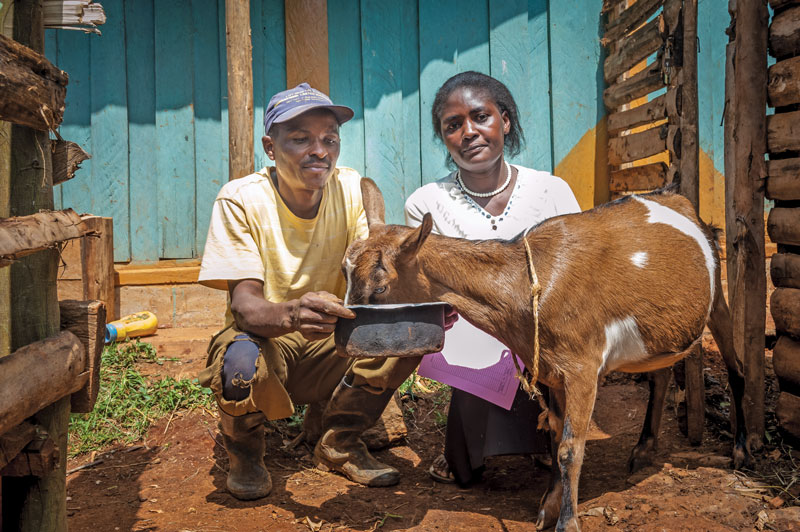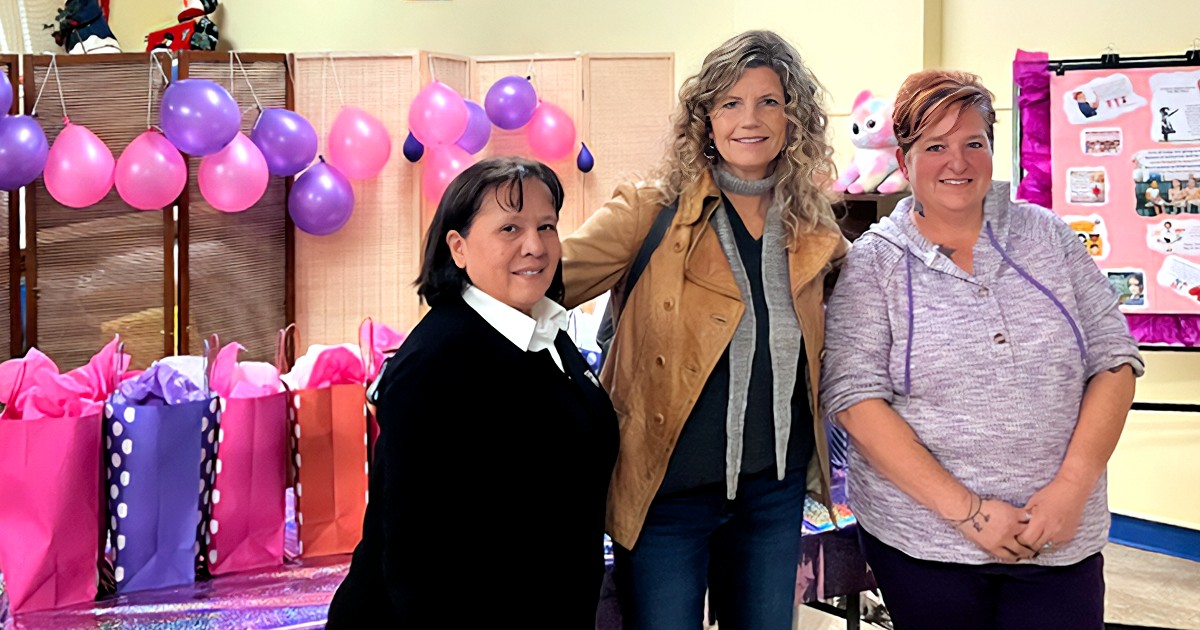In Embu, mere hours from Nairobi, Kenya’s capital city, an elderly woman and her son rake a maize field, where one stalk of corn remains in-husk following their harvest. On the same property, chickens roam free among the tiered fields where women collect tea into wicker baskets, and rows of coffee trees find shade under a canopy of banana leaves.
While Embu’s farming community buzzes among the host of flourishing resources, it is a single goat that attracts the community’s attention. This goat is a lifeline, providing a steady income for families caring for orphaned and vulnerable children (OVCs), through the Salvation Army Embu goat project.
Located on the southern slopes of Mount Kenya, this remote farming community is a short drive from an Army corps, where a microfinance group works together to aid their struggling neighbours. With regular monitoring from project overseers and a local steering committee, the project provides a sustainable source of income for beneficiaries by breeding and distributing baby goats.
Major Brenda Murray, director of the world missions department, recalls visiting the project this past February. “Projects like this one utilize a participatory approach to help communities identify a way forward,” she says. “The goats look healthy and well cared for, which demonstrates the beneficiaries’ ownership of this project.”
When the project launched in 2016, The Salvation Army pledged to provide the goats and any necessary vaccinations for up to two years. The beneficiaries are responsible for constructing a wooden pen. They have access to a local Salvation Army savings and loans group, where they can receive a loan of 3,000 Kenyan shillings (approximately $30), to purchase materials.
While the project overseers distribute goats and offer loans, all other upkeep— such as building the pen, feeding and milking the goats and breeding them to produce offspring—falls to the beneficiaries. The milk is often sold in markets to generate additional revenue.
Though the price of a healthy goat is roughly 15,000 shillings, the return makes them a good investment. A goat consumes five times less than a cow, and takes up far less space; a practical option for farming families surviving on a tight income.
The regions selected for the project are areas where community members rely on livestock to generate a sustainable source of income. A healthy goat is a valuable commodity; males can be leased to other farmers for breeding purposes and females reproduce baby goats that are then sold to other farmers.
“I love seeing the excitement when a community comes together for a common purpose,” says Major Murray. “Helping communities identify their resources and augment the gaps until they can fill them through their own means is what our international development projects are all about.”
The vision for this project is twofold. As beneficiaries make a living from nurturing, breeding and distributing the goats, they are asked to pay it forward to another family with an OVC. This takes place during an annual celebration where the baby goats are collected and redistributed to other communities in need. Their contribution back into the project allows for goat distribution among other families with OVCs, thereby expanding the project and its impact.
The Salvation Army’s Embu Corps hopes that the project will eventually sponsor another six neighbouring regions, in addition to the five communities it currently supports.
“When projects are locally driven, they are more likely to impact the broader community, resulting in sustainable change and providing hope for a better future,” Major Murray explains. “I am so happy to see how the local Salvation Army has engaged the broader community in this initiative.”
Brianne Zelinsky attends North Toronto Community Church. She visited the Kenya East Territory in February as a youth ambassador and communications intern.
While Embu’s farming community buzzes among the host of flourishing resources, it is a single goat that attracts the community’s attention. This goat is a lifeline, providing a steady income for families caring for orphaned and vulnerable children (OVCs), through the Salvation Army Embu goat project.
Located on the southern slopes of Mount Kenya, this remote farming community is a short drive from an Army corps, where a microfinance group works together to aid their struggling neighbours. With regular monitoring from project overseers and a local steering committee, the project provides a sustainable source of income for beneficiaries by breeding and distributing baby goats.
Major Brenda Murray, director of the world missions department, recalls visiting the project this past February. “Projects like this one utilize a participatory approach to help communities identify a way forward,” she says. “The goats look healthy and well cared for, which demonstrates the beneficiaries’ ownership of this project.”
When the project launched in 2016, The Salvation Army pledged to provide the goats and any necessary vaccinations for up to two years. The beneficiaries are responsible for constructing a wooden pen. They have access to a local Salvation Army savings and loans group, where they can receive a loan of 3,000 Kenyan shillings (approximately $30), to purchase materials.
While the project overseers distribute goats and offer loans, all other upkeep— such as building the pen, feeding and milking the goats and breeding them to produce offspring—falls to the beneficiaries. The milk is often sold in markets to generate additional revenue.
Though the price of a healthy goat is roughly 15,000 shillings, the return makes them a good investment. A goat consumes five times less than a cow, and takes up far less space; a practical option for farming families surviving on a tight income.
The regions selected for the project are areas where community members rely on livestock to generate a sustainable source of income. A healthy goat is a valuable commodity; males can be leased to other farmers for breeding purposes and females reproduce baby goats that are then sold to other farmers.
“I love seeing the excitement when a community comes together for a common purpose,” says Major Murray. “Helping communities identify their resources and augment the gaps until they can fill them through their own means is what our international development projects are all about.”
The vision for this project is twofold. As beneficiaries make a living from nurturing, breeding and distributing the goats, they are asked to pay it forward to another family with an OVC. This takes place during an annual celebration where the baby goats are collected and redistributed to other communities in need. Their contribution back into the project allows for goat distribution among other families with OVCs, thereby expanding the project and its impact.
The Salvation Army’s Embu Corps hopes that the project will eventually sponsor another six neighbouring regions, in addition to the five communities it currently supports.
“When projects are locally driven, they are more likely to impact the broader community, resulting in sustainable change and providing hope for a better future,” Major Murray explains. “I am so happy to see how the local Salvation Army has engaged the broader community in this initiative.”
Brianne Zelinsky attends North Toronto Community Church. She visited the Kenya East Territory in February as a youth ambassador and communications intern.










Leave a Comment